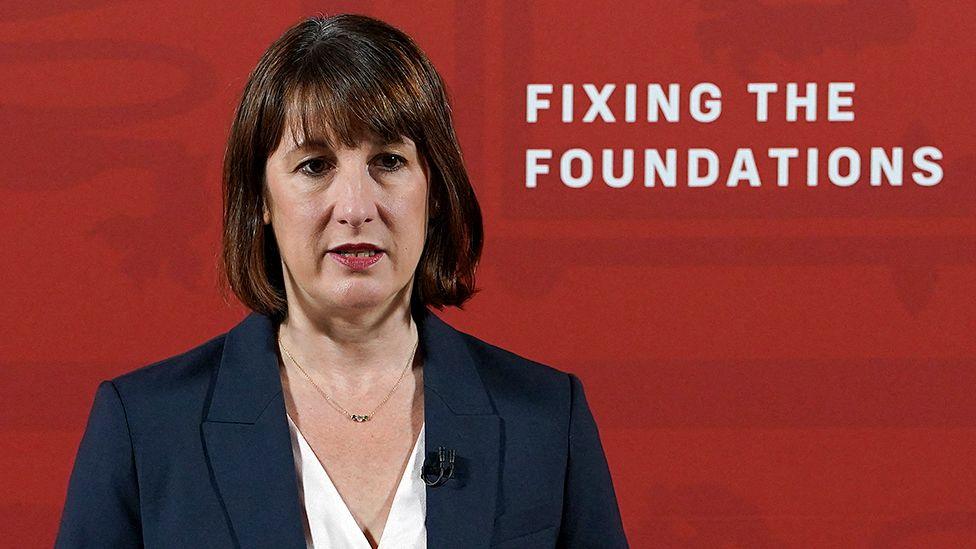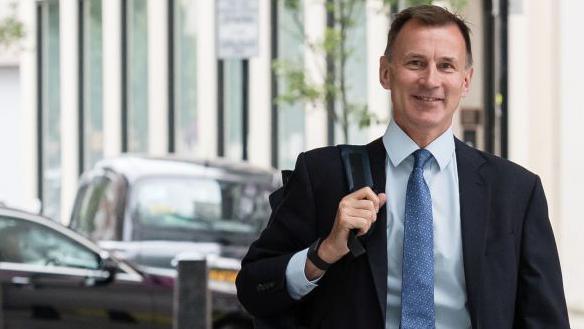We'll have to increase taxes, says Reeves

- Published
The chancellor has said the government will have to raise some taxes in October's Budget after months of speculation about Labour's stance on tax.
"I think we will have to increase taxes in the Budget," Rachel Reeves told the News Agents podcast.
She was responding to a question about raising money following her claim on Monday that the previous government left a £22bn "hole" in the public finances.
Labour said repeatedly during the election campaign there would be no tax rises on "working people", but the Conservatives have insisted Labour will increase them.
Speaking on the podcast, the chancellor was pushed on which taxes the government will raise.
Ms Reeves reiterated that she would not raise VAT, national insurance or income tax, as promised in Labour's manifesto, but she did not rule out increasing inheritance tax, capital gains tax, or reforming tax relief on pensions.
The Treasury said there will be "further difficult decisions on tax and spending" at the Budget in the autumn.
“The chancellor has not committed to any tax rises not already in the manifesto and has committed to not increasing National Insurance, VAT or income tax,” a Treasury spokesperson told the BBC.
The government has already announced details of how it will add VAT (value added tax ) to private school fees at the standard rate of 20% to fund 6,500 new teachers in England.
"I'm not going to write a Budget or start to write a Budget on this podcast," she told the News Agents, adding that Labour wanted to stick to "sensible" rules aimed at reducing the government's longer-term debts.
Ms Reeves' comments come after she scrapped a number of infrastructure projects, and announced the winter fuel allowance for pensions would be means-tested, as part of a series of measures aimed at addressing a shortfall in the public finances.
Winter fuel payments scrapped for millions
- Published29 July 2024
Rachel Reeves's spending audit at-a-glance
- Published29 July 2024
Labour and the Conservatives have been locked in a row over who is to blame for the lack of money in the public purse.
In response to Ms Reeves' podcast interview, shadow chancellor Jeremy Hunt wrote on the social media platform X, external: "By refusing to take the difficult decisions needed, Rachel Reeves will do what she planned all along like every Labour chancellor in history - raise your taxes."
On Monday, however, Ms Reeves had said the Conservatives' "undisclosed" previous spending had forced her to axe the winter fuel allowance and make billions in other cuts.
Mr Hunt has denied this, saying the last government was "open" about the public finances.
He insisted Labour's decisions were a choice and criticised the government's spending announcements since winning power.
The National Wealth Fund, GB Energy, and public sector pay rises added up to billions, he said.
"If you make those choices, you’re going to have to put up taxes and she should be upfront that those are her decisions," he told BBC Breakfast on Tuesday.
The Institute for Fiscal Studies (IFS) has said some of Labour's claims of hidden spending by the previous government "appear" to be correct.
This includes £6.4bn on the asylum system, including the Rwanda deportation scheme, a number that IFS director Paul Johnson called "huge".
However, he added that "half of [the] spending 'hole' is public pay over which government made a choice and where pressures were known".
Labour has already confirmed some tax rises and the chancellor has previously alluded to "difficult decisions" that need to be made.
On Monday, Ms Reeves also announced a windfall tax on oil and gas companies, in addition to the VAT on private school fees - both of which were manifesto commitments.
In response, Liberal Democrat Treasury spokesperson Sarah Olney urged Labour to go further and make large companies "pay their fair share" of tax.

'Pretty difficult'
Mr Johnson, of the IFS, told the BBC's Today programme last week that big tax increases "aren't impossible, but they'd be pretty difficult" given Labour's pledges not to raise income tax, national insurance and most aspects of VAT.
He added that many experts agree that most public services are performing considerably worse than they were in 2010, when the Conservative and Liberal Democrat coalition government brought in austerity.
Local authorities such as Birmingham have been going bust, NHS waiting lists have increased, and public sector pay is a long way behind private sector pay, he said.
"The choice, as ever, is do you want the public services to be as good as they are, better than they are, or are you willing to see them get worse?" he said.
Alongside the three biggest tax earners - VAT, national insurance and income tax - Labour has also pledged not to raise corporation tax, which is the tax businesses pay on their profits and is currently at 25%.
It has also said that income tax thresholds - the amount of money you can earn before any tax starts to be paid - will remain frozen until 2028, as was the case under the previous Conservative administration.
The policy amounts to a tax rise due to a process called "fiscal drag", which sees more people "dragged" into paying higher rates of tax as wages rise.
Mr Johnson said the government could choose to increase capital gains tax - which is paid on profits from selling an asset - or inheritance tax.
It might also change the amount of tax relief available on pension contributions, although this "might put people off from saving in their pensions".